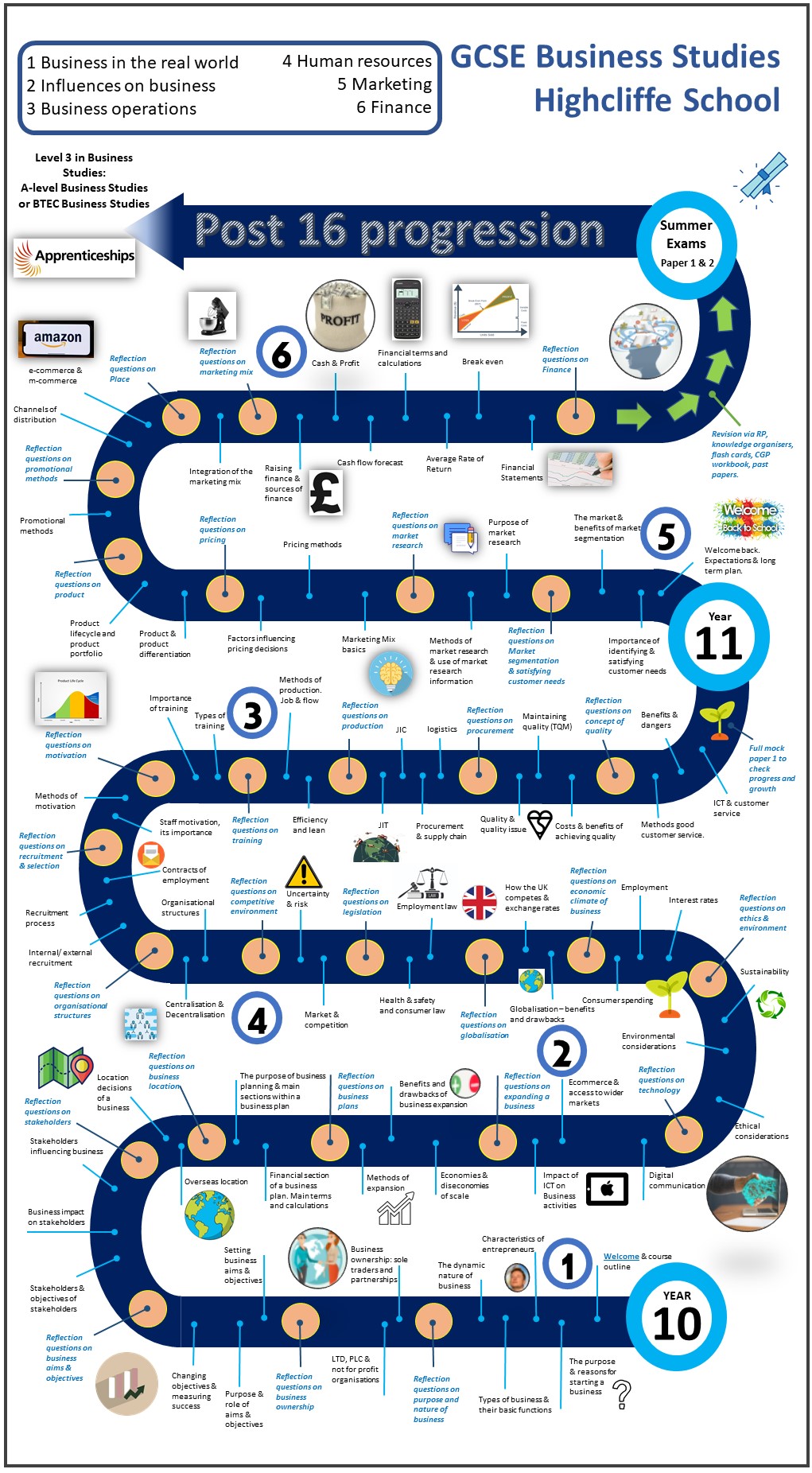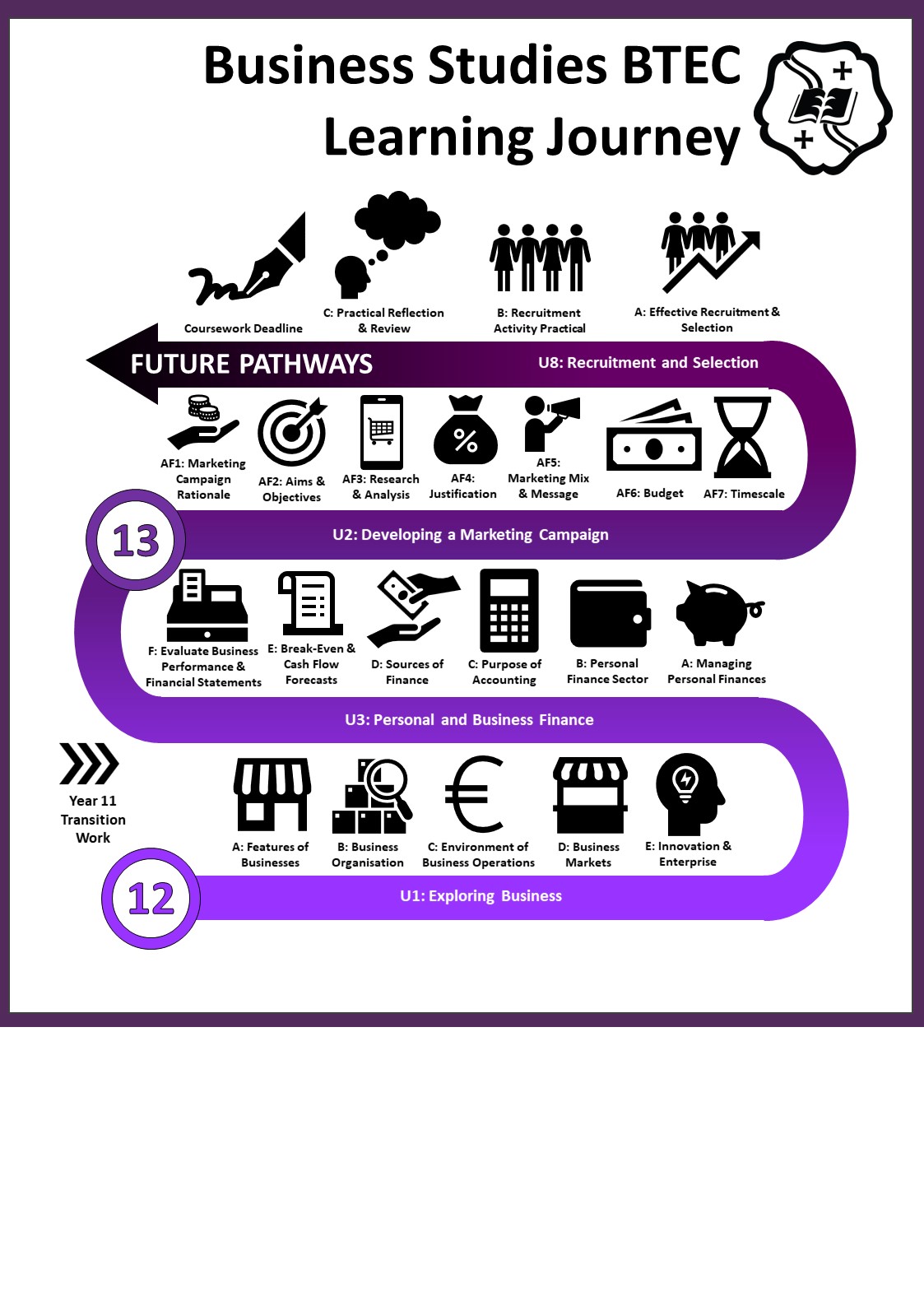To equip our students with the necessary skills and knowledge to develop their social, economic and technological awareness and to enrich their employability skills to help inform their choices of future pathways. We want to build awareness of cyber security to give mechanisms to help student’s combat current challenges around online behaviour.
In year 9, students complete the Real Business Challenge, which is a combination of both theory and practical, resulting in students working in groups to produce a product and presentation based around a realistic, vocational brief. A final presentation will be presented to the rest of the class.
Our specification requires students to draw on the knowledge and understanding to use business terminology to identify and explain business activity. Students will learn to apply business concepts to familiar and unfamiliar contexts and develop problem solving and decision making skills relevant to business. Students will investigate, analyse and evaluate business opportunities and issues and make justified decisions using both qualitative and quantitative data including its selection, interpretation, analysis and evaluation, and the application of appropriate quantitative skills.
Exam Board: AQA
Qualification Title: Business
Qualification Specification Code: 8132
Qualification Webpage: Click here to visit the AQA webpage for the specification.
The GCSE in Business will give learners a real, in-depth understanding of how the business world works. They will see how a business works holistically, using relevant and up to date real life examples to help explain and apply the knowledge. Students will also gain experience of team working skills, research skills, creativity and other employability skills that will prepare the students for taking Business in sixth form or moving into an apprenticeship.
Skills that you will need, or that you will be required to develop, include:
• Quantitative and qualitative skills including using and interpreting data.
• Develop as enterprising individuals with the ability to think commercially and creatively.
• Develop as effective and independent students, and as critical and reflective thinkers with enquiring minds.
• Use an enquiring, critical approach to make informed judgements.
• Investigate and analyse real business opportunities and issues to construct well-argued, well evidenced, balanced and structured arguments.

Paper 1 - Influences of operations and HRM on business activity.
Written Exam – 1 hour 45 mins
50% of total assessment
Section A has multiple choice questions and short answer questions worth 20 marks, section B has one case study / data response stimuli with questions worth approximately 34 marks and section C has one case study/data response stimuli with questions worth approximately 36 marks.
Paper 2 – Influences of marketing and finance on business activity
Written Exam – 1 hour 45 mins
50% of total assessment
Section A has multiple choice questions and short answer questions worth 20 marks, section B has one case study / data response stimuli with questions worth approximately 34 marks and section C has one case study/data response stimuli with questions worth approximately 36 marks.
Entrepreneur / Company founder
Business related degrees in Law, Sociology, Banking, Accounting and Finance
Government or local council
Retai
Construction
Environmental Science
s
Marketing and Advertising, especially digital
Sales
Education
Project Manager
BTEC Business follows on from GCSE Business, although GCSE Business is not a requirement for this course. The content is appropriate and consistent with current practice for learners planning to enter employment directly into the Business sector or take Business into Higher Education. The learning programme covers four units. The first covers how learners study the purposes of different businesses, their structure, the effect of the external environment, and how they need to be dynamic and innovative to survive. The second covers how learners gain skills relating to, and an understanding of, how a marketing campaign is developed. The third addresses how learners study the purpose and importance of personal and business finance. They will also develop the skills and knowledge needed to understand, analyse and prepare financial information. The final unit explores how the recruitment process is carried out in a business and gives learners the opportunity to participate in selection interviews and review their performance
To provide a successful curriculum suited to our student intake profile, balancing core learning with guided, differentiated pathways for sub-groups or individuals which inspire and engage students whilst successfully preparing them for progression at age 18 and future life as learners, employers and citizens.
To give the students a real world understanding of the use of technology in the wider world and to provide a theoretical level of knowledge in the history and inner workings of key aspects of the computer. To cultivate creative and dynamic problem solvers, both when using technology and in general, by developing the key skills of computational thinking.
To give students a deep understanding and engage learners to enhance their awareness of current affairs and key Economic and Business topics to enrich and develop their cultural capital and prepare them for a rapidly changing external environment. To equip students with the analytical and evaluative skills required to form judgments and opinions about why key decisions are taken by the government and the impact on the world around us. We want learners to demonstrate that they can identify and use effectively, in an integrated way, an appropriate selection of skills, techniques, concepts, theories and knowledge to help them prepare for progression to employment, apprentices and further education.
Exam Board: Edexcel Pearson Extended Certificate
Qualification Title: Business - BTEC Level 3 National Extended Certificate
Qualification Specification Code:
Qualification Webpage: Click here to visit the Edexcel Pearson Extended Certificate webpage for the specification.
Standard Sixth Form entry requirements.

Business related degrees, Law, Sociology, Psychology, Banking or Accounting and Finance. The best opportunities for progression in the world of Business in the future lies in Languages. If you have a passion for Spanish or French, then the world of Business opens up even further. Pathways could lead to employment directly or a Business related apprenticeship.
Learners will also develop employability skills such as cognitive and problem-solving skills, intrapersonal skills and interpersonal skills. BTEC Nationals provide a vocational context in which learners can develop the knowledge and skills required for particular degree courses. These include effective writing, analytical skills, creative development and preparation for assessment methods used in degrees.
Mrs Downs
Owned by: MDS | Last Published: 20/09/2019 09:53:36 | Next Update: N/A